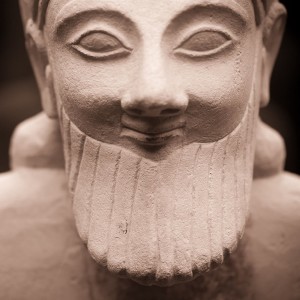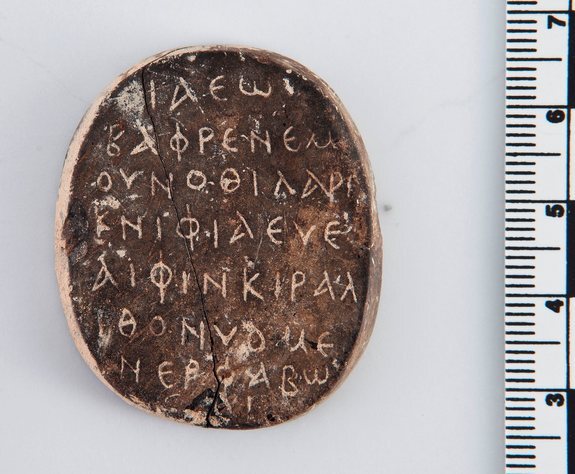The History of Cyprus Podcast
Welcome to The History of Cyprus Podcast -- a monthly series exploring the island’s past from 10,000 BCE to the 20th century. Each episode features in-depth conversations with leading scholars in archaeology, linguistics, political and social history, bringing academic insight to a wide audience. Together, we uncover the languages, cultures, conflicts, and legacies that shaped one of the Mediterranean’s most storied crossroads. Whether you’re a student, a history enthusiast, or just curious about Cyprus, this podcast offers something for everyone -- rooted in research, driven by storytelling. If you’d like to reach me, my name is Andreas. Please feel free to send me an email at cyprusthepodcast@gmail.com --------------------------------------------------------------- Follow The History of Cyprus Podcast Instagram and support the show on Patreon: https://www.patreon.com/TheHistoryofCyprusPodcast https://instagram.com/thehistoryofcyprus *The podcast image, ”Dressed for the Gods” (250BC) is from the British Museum taken by William Warby. Check out more of his work at flickr.com/photos/wwarby/
Episodes

Saturday Nov 02, 2024
Saturday Nov 02, 2024
Clearchus of Soli was an ancient philosopher who lived in the 4th century BCE and was primarily known for his contributions to ethics and moral philosophy. Clearchus was a student of Aristotle who is often associated with his Peripatetic school. He wrote extensively on Eastern Cultures and is thought to have traveled eastward-bound, to the Bactrian city of Ai-Khanoum (Alexandria on the Oxus?) in modern Afghanistan, in order to help Hellenize the city in a post-Alexandrian era. Join me as I welcome Professor Gertjan Verhasselt to discuss this fascinating and relatively unknown Cypriot philosopher, Clearchus of Soli!

Tuesday Oct 15, 2024
Tuesday Oct 15, 2024
Ai-Khanoum was an ancient Greek city located in the northern part of modern-day Afghanistan, near the border with Tajikistan. This city was notable for its Hellenistic architectural and cultural influence, and it served as a center of Greek culture and administration in the region. So what could this possibly have to do with Cyprus?The Cypriot philosopher, Clearchus of Soli, was said to have travelled there in order to assist in the Hellenization of the city by another compatriot of his, Stasanor, who served as a general under Alexander the Great and later became the satrap of Bactria. You heard right. The Ai Khanoum inscription (a maxim of the Delphic Oracle) is said to have been commissioned by Clearchus to honour the founder of the city. But just who was Clearchus? And how did Cypriot(s) (not just one!) make their way to Ancient Bactria/Afghanistan? Next month, I discuss Clearchus with Professor Gertjan Verhasselt from the University of Padova.**You may have noticed that this upload is a bit earlier than usual. And that's because there is something very special coming mid-month on The History of Cyprus Podcast that I am incredibly excited for. Stay tuned for an October 17th Special Episode!

Thursday Oct 10, 2024
Thursday Oct 10, 2024
Itsy bitsy sausagesBlack hilted knifeEat and departTo the place of no return*If you're like me, you've almost certainly heard the stories. Light your fireplace. Set your colanders out. Placate them with food and desserts until the Epiphany bells ring. Then -- and only then -- will they return to the underworld. Ironically, the Twelve Days of Christmas could be a terrifying time. And for some growing up in Cyprus, they certainly were. By now, I'm sure you've figured out what I'm referring to: I'm talking about the malodorous, beastial and malicious goblins -- the καλικάντζαροι (kalikantzari). I've always wondered where these stories might have originated, what these creatures represented and even what they might have looked like. Imagine my surprise (and joy) to find out that they're making their way to the BIG screen!For this incredible episode, I'm joined by filmmaker, Minos Papas, who talks to me about his latest film, "Motherwitch: Δωδεκάμερον," which is slated for a 2025/2026 global release. The movie, set in 19th century Cyprus, stars Margarita Zachariou as Eleni, "an outcast painter, [who] tries to resurrect her dead children but unleashes a horde of creatures upon her village" (IMDb). Motherwitch, which is partially funded by Cypriot Department of Cultural Service, also stars Athos Antoniou, John Hughes and Miltos Yerolemou (of Game of Thrones fame). Minos and I discuss the art of film, the origins of Kalikantzari in Cypriot folklore and imagination, the work that went into the pre and post production and finally, what we can expect in the coming months. Though a work of fiction and fantasy, Motherwitch excites me as it is a culmination of years of research, and painstaking attention to historical accuracy and detail. It is a movie which strives to be a faithful to the period, capturing not only the look and feel, but the language and customs of the time. This is the first time Cyprus' culture will make its way to the Big Screen. You can support Motherwitch in its distribution here where you can access a sneak peek to some scenes from the movie!---->Motherwitch Kickstarter---->Motherwitch InstagramFollow and support The History of Cyprus Podcast. Episodes are released on the 2nd of every month while Primary Source recordings are released on the 15th, the month prior!----> Instagram! The History of Cyprus Podcast----> Patreon! The History of Cyprus Podcast*These words are typically said while "feeding" the Kalikantzari

Wednesday Oct 02, 2024
Wednesday Oct 02, 2024
As World War I engulfed Europe, Britain and its colonies were not spared. Despite Cyprus avoiding conscription like Canada, the British coaxed Cypriots to enlist in auxiliary roles, notably the mule corps, to aid the Allies on the Salonica front. Promised non-combat duties, Cypriots soon found themselves thrust into conflict. How were they persuaded? What trials did they face? How did they fare upon their return? I welcome back Professor Andrekos Varnava from Flinders University as we discuss one of his latest books, "Serving the Empire in the Great War: The Cypriot Mule Corps, Imperial Loyalty and Silenced Memory," which you can find on Amazon: (this is the Canadian Website).

Sunday Sep 15, 2024
Sunday Sep 15, 2024
For this month's primary source, I've taken some liberty with its recording, turning this very real enlistment ad into a radio spot. However, historically speaking, there was no radio service at the time -- and so this certainly would not have been broadcast in Cyprus. Given the widespread illiteracy at the time, enlistment campaigns such as the one here, would've been read aloud at the local καφενεíο (coffee-house) by the village teacher to any man in earshot to advertise the high rates of pay, food, clothing and relative safety in supporting Great Britain during the First World War. Though many are familiar with Cyprus' participation in the Second World War, its role in the First is less known. Why would Cypriots have enlisted to begin with? And did they indeed face "non-combative roles" as promised? Next month, I welcome back Professor Andrekos Varnava from Flinders University as we discuss one of his latest books, "Serving the Empire in the Great War: The Cypriot Mule Corps, Imperial Loyalty and Silenced Memory."

Tuesday Sep 10, 2024
Tuesday Sep 10, 2024
In this episode, Professor Andrew Erskine (University of Edinburgh) delves into the life and legacy of Zeno of Citium, the ancient philosopher whose teachings laid the foundation for the Stoic school of thought. Born in Citium (Kition) Cyprus, Zeno's journey from humble beginnings to philosophical prominence is a testament to the power of resilience and intellectual curiosity. Shipwrecked in Athens, he established his own philosophical school in the Stoa where his students became known as "Stoics." Stoicism had many famous adherents, including of course, Emperor Marcus Aurelius. But Andrew shares with us a lesser known Stoic, and fellow Cypriot, Persaeus of Citium, a favourite student of Zeno's, who becomes an influential member in the Macedonian Court. So who was Zeno? What were the tenets of Stoicism? And what impact did Zeno's thought have on the Greco-Roman world? Join us as we explore Zeno's upbringing in Cyprus, his philosophical influences, and the enduring impact of Stoicism on modern thought.Consider signing up as a patron on Patreon. For as little as $1 a month, your contributions help fund the History of Cyprus Podcast and keep it ad free. Please consider supporting the History of Cyprus Podcast and help build this digital repository of Cypriot history! https://www.patreon.com/TheHistoryofCyprusPodcast

Monday Sep 02, 2024
Monday Sep 02, 2024
In the 4th century, a series of powerful earthquakes shook the island of Cyprus, leaving a profound impact on its inhabitants and Kourion in particular. These seismic events not only disrupted daily life but also reshaped the landscape, causing widespread destruction and challenging the resilience of Cypriots. The earthquakes of the 4th century stand as a testament to the enduring spirit of those who faced and rebuilt their communities in the wake of nature's formidable fury. This month, I speak with the co-director of the Kourion Urban Space Project, Dr. Laura Swantek, as KUSP enters its 14th season at Kourion.

Thursday Aug 15, 2024
Thursday Aug 15, 2024
The Sibyls of ancient Greece and Rome were oracles that divined the future by channeling the god, Apollo. Sibyls were considered to be intermediaries between the mortal world and the divine realm, and their pronouncements were highly regarded by the Greeks. Sibyls were often consulted by individuals, city-states, and rulers seeking guidance on important matters such as warfare, politics, and religion. They were believed to possess deep wisdom and knowledge of the future, and their utterances were typically written down and preserved as sacred texts. For this month's primary source, we hear an amalgam of prophesies as they relate to Cyprus -- specifically a series of ominous predictions of earthquakes and floods predating the infamous 4th century earthquake that levelled parts of Cyprus including Kourion. Fitting, as next I interview Laura Swantek, the assistant director of the Kourion Urban Space Project!

Friday Aug 02, 2024
Friday Aug 02, 2024
Votive practices in Cyprus have long been an integral part of the island's rich cultural and religious traditions. Cypriots have engaged in diverse acts of votive offerings to express gratitude, seek divine favor, or fulfill vows. In ancient Cyprus, votives played a significant role in the worship of various deities. The sanctuaries dedicated to gods and goddesses were adorned with votive objects such as statues, terracotta figurines, and ceramic vessels. If you're looking at a statuette in a museum -- there's a good chance that you're looking at a votive that was once offered to a god/or goddess and was excavated from a temple. These offerings were given as tokens of devotion, seeking blessings, protection, or even healing. This month I welcome Dr. Erin Averett, associate director of the Athienou-Malloura site, to discuss the Votive Tradition in Cyprus.

Monday Jul 15, 2024
Monday Jul 15, 2024
The Idalion Bilingual inscription comprises a dedication composed in Phoenician and Greek, using the Cypriot syllabic script. This inscription played a crucial role in deciphering the Cypriot syllabic writing system and is often referred to as the equivalent of the 'Rosetta stone' in Cyprus. Despite Idalion being under Phoenician rule at that time, Greek was still widely spoken as it was most certainly a multilingual city. The Idalion Bilingual was discovered in an area within the Sanctuary of Apollo that appears to have been utilized by both Greeks and Phoenicians.
Originally, the stone carrying the inscription would have supported a statue honoring Apollo/Reshep. Though quite a short primary source, the reading offers a look into the traditions of temple dedications as we discuss votives and rural sanctuaries with Dr. Erin Averett next month.











